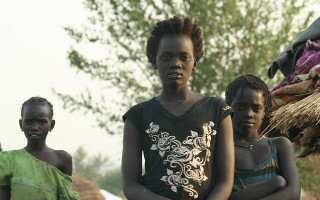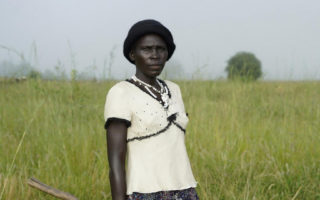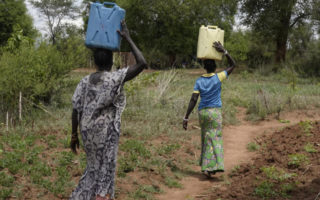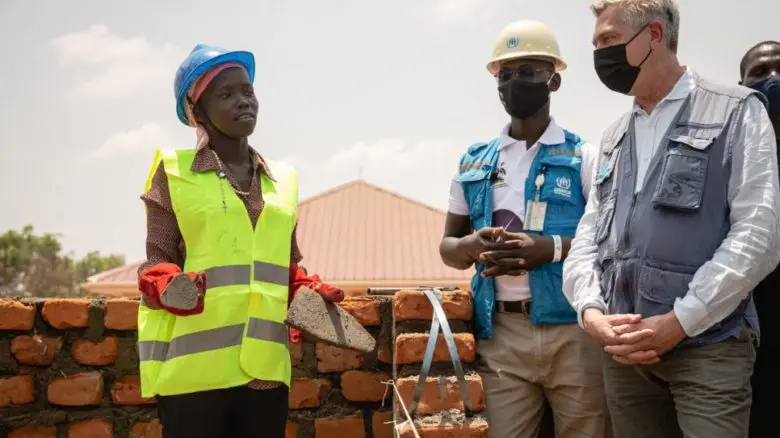
Agnes Baitio, 32, a refugee from South Sudan, shows UNHCR’s Filippo Grandi the construction project she leads in Uganda’s Bidibidi refugee settlement. © UNHCR/Esther Ruth Mbabazi
On a visit to Bidibidi settlement, UN High Commissioner for Refugees Filippo Grandi described projects involving government, refugees, aid groups and locals as ‘game changers’.
By Yonna Tukundane and Wendy Kasujja in Bidibidi, Uganda
When Agnes Baitio fled fighting in Nimule, South Sudan, four years ago with her two children, she saved her family but lost everything else – her house, her income and her hope.
Settling into a new life in Uganda, in the Bidibidi refugee settlement, Agnes, 32, sought counselling to help her adjust. But last December, when she learned about a construction job that would allow her to build shelters for people working at the settlement, she felt alive again.
It was a chance to act on a dream she had back home, after encountering a woman who worked in the building trade.
“I knew I needed to be like her,” said Agnes, who now leads a team of 30 refugees and 20 Ugandans working on the project, which is funded and run by UNHCR, the UN Refugee Agency. Half of the refugees on the team are women.
When humanitarian and development partners work together with government, projects such as the one Agnes works on can be “game changers” for rural areas, said UN High Commissioner for Refugees Filippo Grandi during a visit this week to the Bidibidi settlement and the surrounding town of Yumbe, in northern Uganda.
As he toured the area by car, Grandi saw hundreds of electric poles and cables, part of a project led by Uganda’s Rural Electrification Agency to connect the Bidibidi settlement to the national grid. When the Bidibidi electric grid goes live, UNHCR will support “last mile” connection for schools, health centres and markets.
“What I witnessed in Yumbe is extraordinary,” Grandi said, adding that Uganda embodies the ideals laid out in the Global Compact on Refugees, which calls on governments, the private sector and international organizations to unite to improve the lives of people who have been forced to flee their homes and ease the burden on the countries that provide them refuge.
“Uganda’s realization of the vision for shared responsibility and a comprehensive response to refugee crises gives me fresh confidence,” Grandi said.
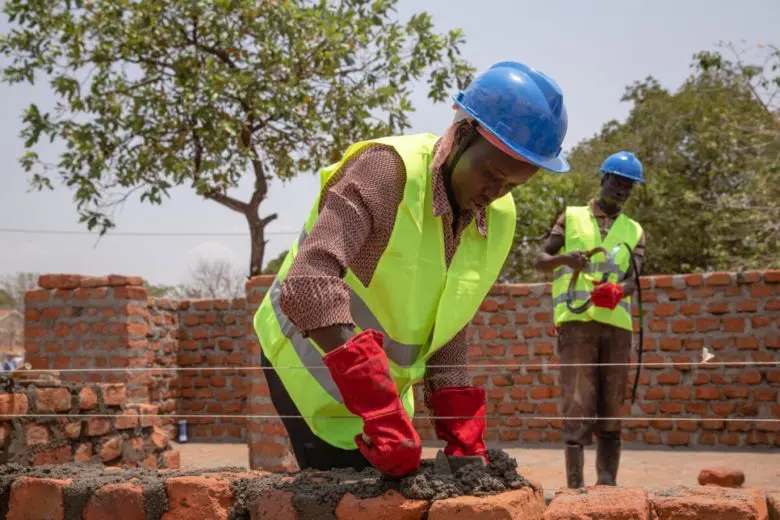
Agnes says working in construction has earned her a new skill and an improved income to support her family. © UNHCR/Esther Ruth Mbabazi
Uganda hosts the largest number of refugees in Africa – more than 1.45 million, mostly from South Sudan but also from the Democratic Republic of the Congo and Burundi. The Bidibidi settlement alone hosts 235,000 people.
The country has one of the most progressive refugee policies in the world, allowing refugees to use land for housing and farming, work, and move around the country freely. Uganda’s Minister of State for Local Government Jennifer Namuyangu said the contributions of refugees benefit all Ugandans, economically and socially.
“Uganda is proud to lead a positive narrative on refugees and to demonstrate not only our humanity, but that together refugees and host communities can thrive,” said Namuyangu, who accompanied the High Commissioner on the trip to Bidibidi.
“I know women have power to do everything.”
The Minister and the High Commissioner stressed the need for consistent international support. Grandi urged the international community to “remain engaged at the highest level” to ensure Uganda receives the necessary resources to accelerate the transition to sustainable local government services.
For Agnes, the opportunity to work has not only restored her hope but also given her valuable skills. Her team is constructing houses for the staff of the Office of the Prime Minister, many of whom are now living in worn tents given to them two years ago by UNHCR. Next, Agnes and many from her team will build a soap factory.
“I know women have power to do everything,” she said.
Originally published by UNHCR on 11 March 2021.



